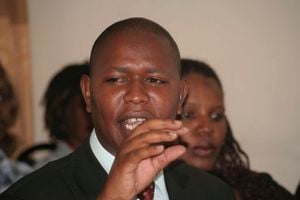Address the real problems of laptop project
What you need to know:
- Shifting custody of implementation of the project from one ministry to another will not address the problems that have dogged it right from inception.
- The solution lies in effectively targeting and putting to an end endemic corruption in the government tendering system. Fighting corruption takes political will and courage.
Among President Uhuru Kenyatta’s key campaign policy promises, none seemed as ambitious as the free laptops project for primary school children. The project has stubbornly defied several attempts to get it started.
The latest is this week’s presidential directive that the responsibility of managing the project be transferred to the Ministry of Information and Communications.
Other ministries peripherally tasked with assisting include the Ministry of Energy, the National Treasury, the Ministry of Industrialisation, and the Attorney-General’s office. Locking out the Ministry of Education is puzzling, given that education is its key responsibility.
Some of the immediate challenges that stand in the way of the successful implementation of the project include lack of high speed internet connectivity in some rural and remote areas and ongoing technical support, licensing costs for the software to be installed on the laptops, high insurance costs against damage to the equipment as well as lack of evidence that teachers, who will be responsible for implementing the project, have sufficient skills and training.
MAJOR CHALLENGES
Some remote and rural schools have yet to be connected to the national electricity grid.
The huge financial impost of such a project on taxpayers and high levels of corruption in the government stand out as the two biggest challenges to the realisation of the project, which has stalled for months owing largely to wrangles between powerful forces within government queuing to have a slice of the pie.
Shifting custody of implementation of the project from one ministry to another will not address the problems that have dogged it right from inception.
The solution lies in effectively targeting and putting to an end endemic corruption in the government tendering system. Fighting corruption takes political will and courage. I doubt that the current government has the backbone or political will to prosecute a genuine war against corruption.
A close interrogation of the huge costs of successfully initiating and running such an ambitious project suggests that the government will need to spend billions of shillings over and above the budgeted cost. This puts the laptop project into the basket of unsustainable initiatives, another white elephant in the making.
INTERNET ACCESS
Perhaps a lesson from Australia might help project the future trajectory of the laptop project. Under the leadership of former Prime Minister Kevin Rudd, then opposition leader, the Labour Party in its 2007 election campaign promised to embark on a digital education revolution (DER), equipping each senior high school student with a laptop with high speed internet access.
The estimated cost was 2.207 billion Australian dollars (about Sh170 billion) to run the DER programme over five years. There were rumblings that the programme was underfunded and one short year later, in 2008, the federal government was forced to negotiate with state governments for a contribution towards running it.
The programme wound up in 2013 and with it the funds for running it. The cost slowly shifted to parents as more and more schools started adopting the bring your own device approach.
Only time will tell whether the laptop project was a genius masterstroke or emanating from a fanciful thought bubble.
The writer is a security and terrorism analyst based in Melbourne, Australia. [email protected]




